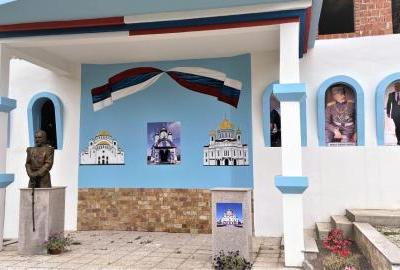Novosti
FROM THE KINDERGARTEN TO THE FACULTY: To whom is Russia a “promised country”
Russia wishes to attain influence in BiH through culture and education, but by using as little money as possible. The authorities of Republika Srpska are responsible for that and so are the individual contributions made by the admirers of Russia through several associations with the Serbian-Russian prefix
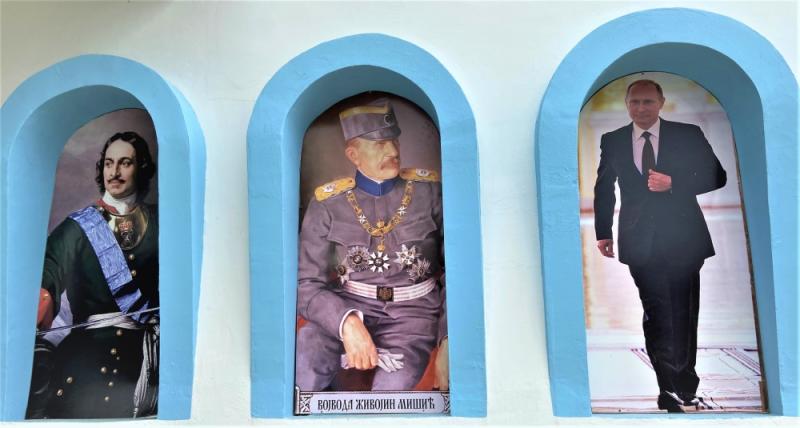
Village Ritešići is located some twenty kilometers north of Doboj. The village is dominated by the monastery of St. Matrona of Moscow, whose construction was initiated ten years ago at the initiative of the local Association of Serbian-Russian Friendship and Unity of Orthodox Peoples. The monastery was handed over to governance of Eparchy of Zvornik-Tuzla.
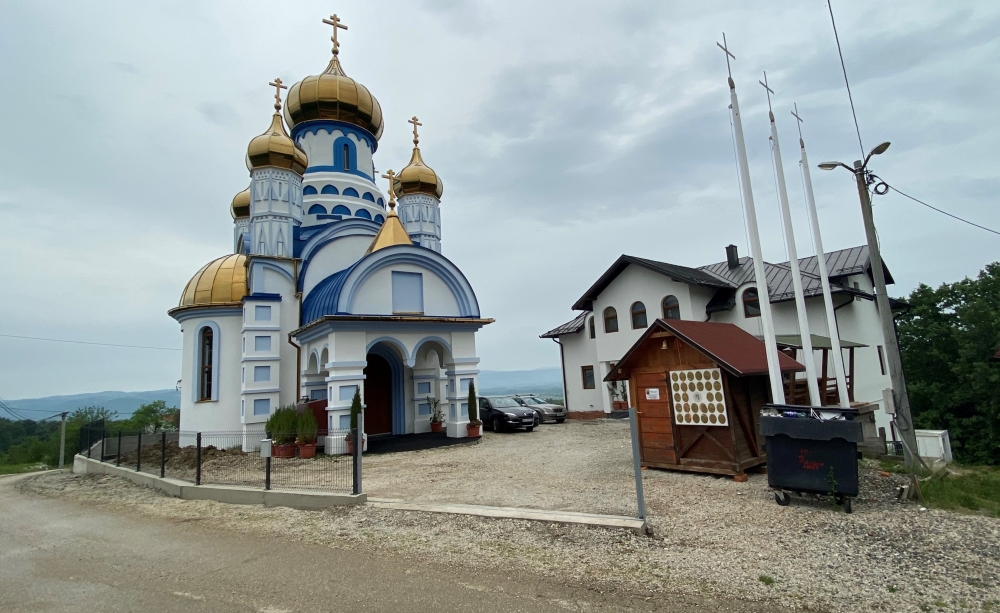
Across from the monastery is an unfinished building that should be a Serbian-Russian spiritual center within an ethno village built by the same association. A fundraising dinner was held at the end of 2019 in presence of the president of Republika Srpska, Željka Cvijanović and representatives of the Embassy of the Russian Federation in BiH.
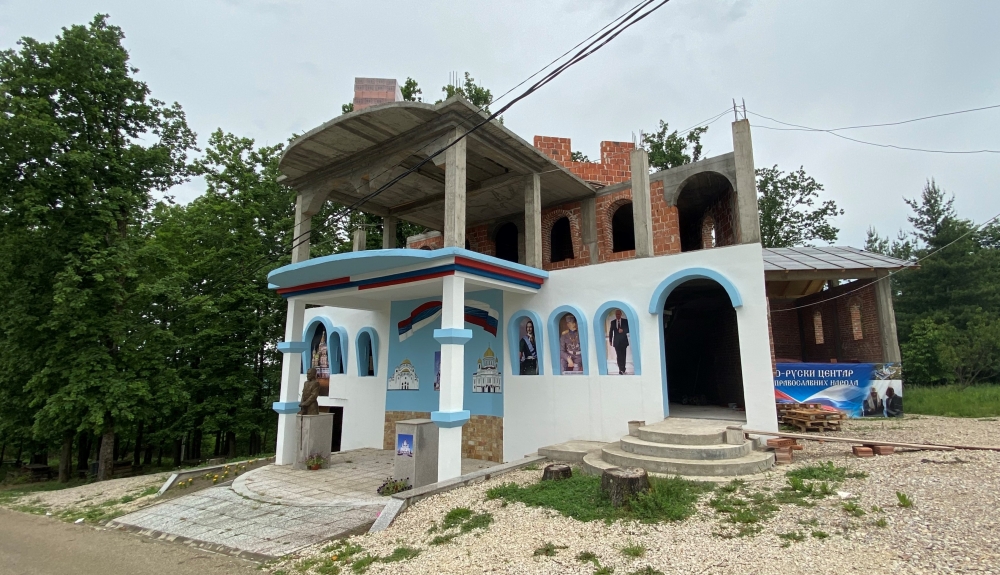
A bust to the Russian Czar Nicholas II was revealed in front of the building three years ago.
On that occasion, Petr Ivancov, Russian Ambassador to BiH, said: “My colleagues have been talking about Russian influence lately, and I believe that today’s event confirms that it is not influence, but friendship.”
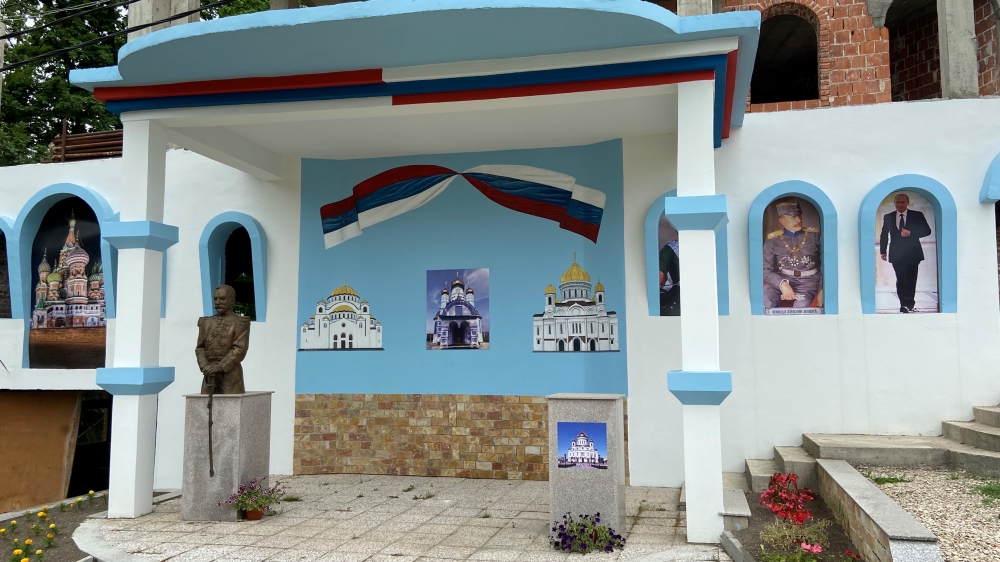
“We wanted to make something that ties the friendship of Orthodox peoples. We handed over the monastery to the Eparchy, and we are thinking about building an ethno village. However, Russia is globally a country that wishes peace to everyone and does not interfere in someone else’s business. If it did not protect anyone, it certainly did not attack. We, as an association, want to have peace in this region, to respect each other, to build churches and mosques”, said president of the Association of Serbian-Russian Friendship and Unity of Orthodox Peoples, Zoran Gajić, explaining the motives behind construction of the monastery and the center for Žurnal.
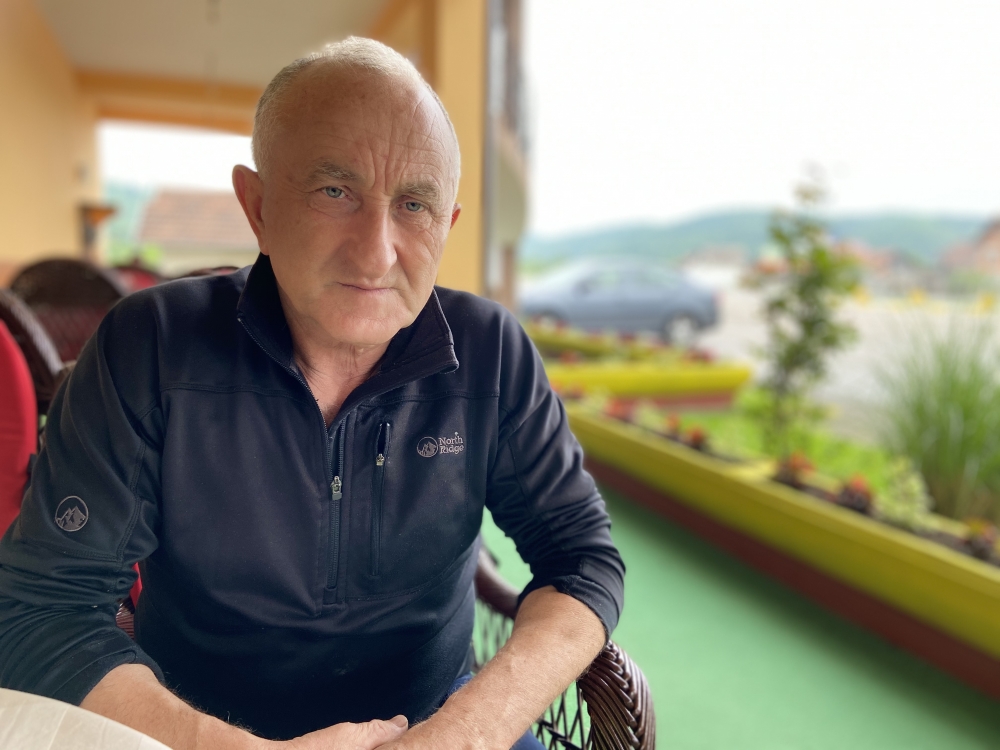
Zoran Gajić
Gajić admits that the additional motive is an attempt to attract the ones who tour Orthodox buildings, and to generate additional profit with accompanying tourist offer. The members of the organization “Night Wolves” (loc. Noćni vukovi) managed to visit the monastery just at the time when their leaders were banned from entering Bosnia and Herzegovina.
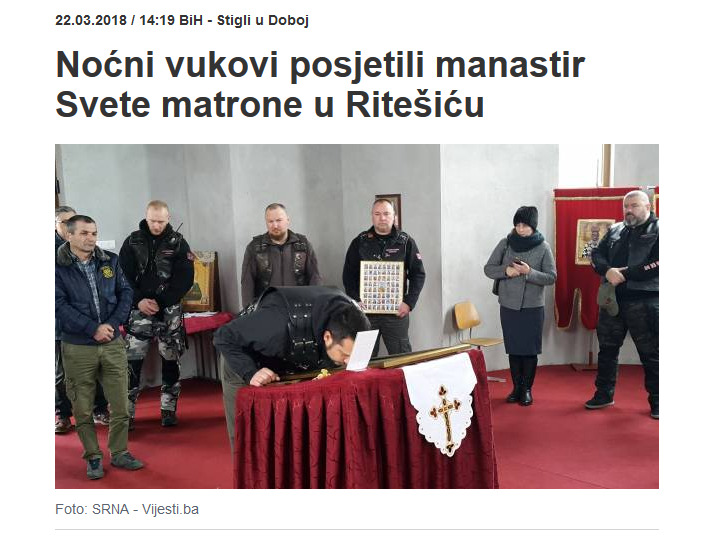 Night wolves visited monastery of St. Matrona in Ritešić Photo: SRNA – Vijesti.ba
Night wolves visited monastery of St. Matrona in Ritešić Photo: SRNA – Vijesti.ba
“We realized though that Russia is a country that does not want to attain some of its objectives just to have you destroyed,” claims Gajić, noting that as an association they do not wish anything bad to any of the peoples or religions in BiH. When asked how much financial assistance is coming from Russia for construction of their center, he admitted that the local people contribute the most through the donations.
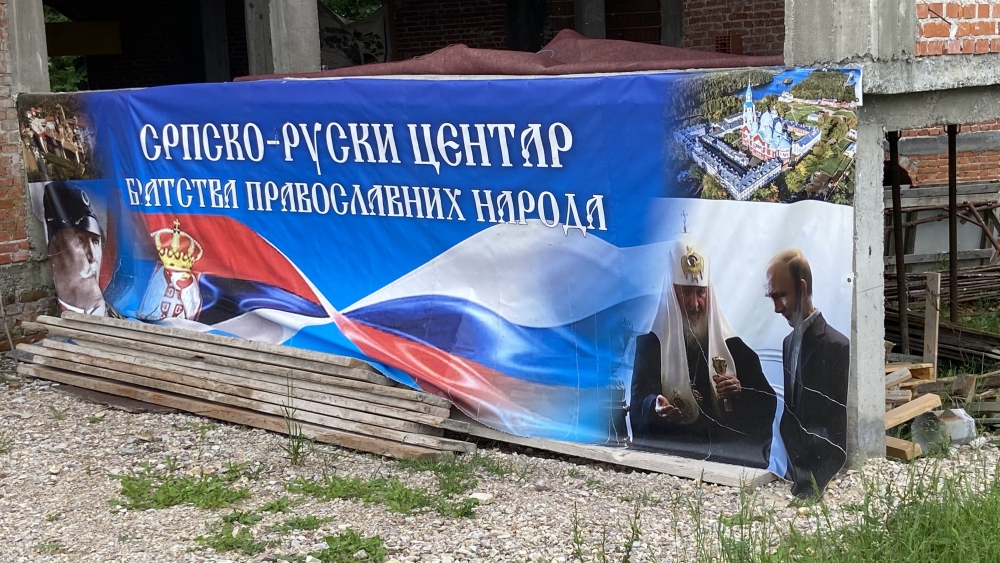 Serbian-Russian Center of Orthodox Peoples’ Friendship
Serbian-Russian Center of Orthodox Peoples’ Friendship
Construction of the Serbian-Russian Center in Banja Luka downtown, as a memorial to the Russian Czar Nicholas II and his Romanov family, gives the right to the advocates of the thesis that Russia is certainly supporting promotion and enthronement of the Russian spirituality in this area, but by investing as little money as possible. Apart from the church, other facilities will be built on 6.500 square meters’ surface area in which, as announced, Russian culture will be promoted.
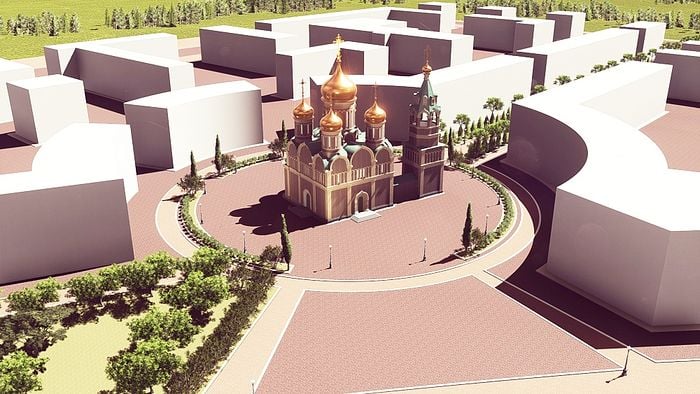
“It is an opportunity to reaffirm important friendship that we have with the Russian Federation. I do not see any underground operation in that, but only cooperation of two brotherly peoples and two countries”, assured the RS president Milorad Dodik in 2018.
Two and a half years later no progress was made with the construction. It is disputable if the foundations would be even laid down without 6 million KM earmarked by the Government of RS. There are no funds coming from Russia for the building that should symbolize loyalty and gratitude to this country.
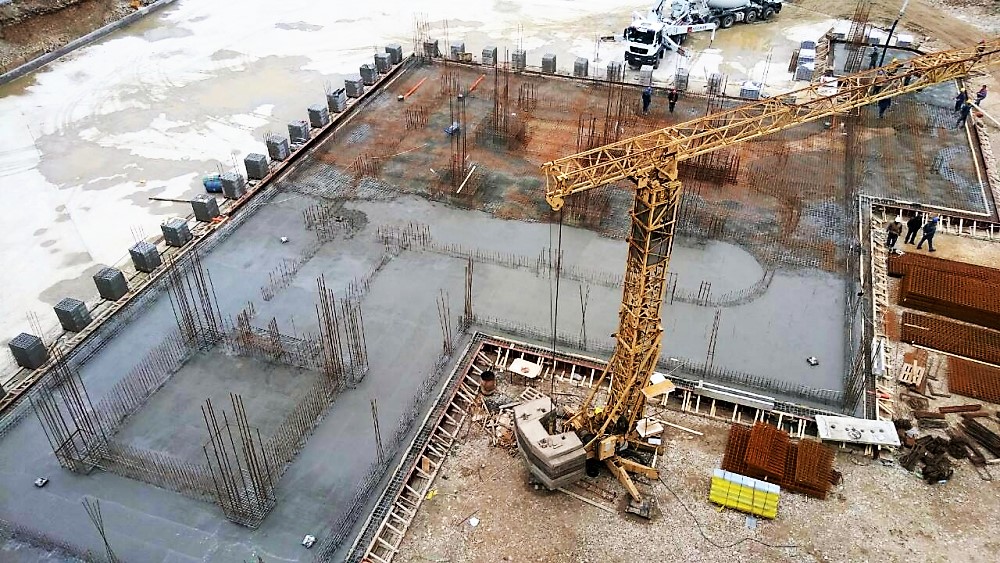
Russia realizes strong cultural ties in Bosnia and Herzegovina through the Russian Orthodox Church, whose spread of influence in Republika Srpska is still viewed peacefully by the Serbian Orthodox Church. So an interview with the Bishop of Gorodets and Vetluga Augustine was broadcast by the entity public broadcaster at the beginning of the year, after having the Russian priests touring churches and monasteries in Republika Srpska for many years.
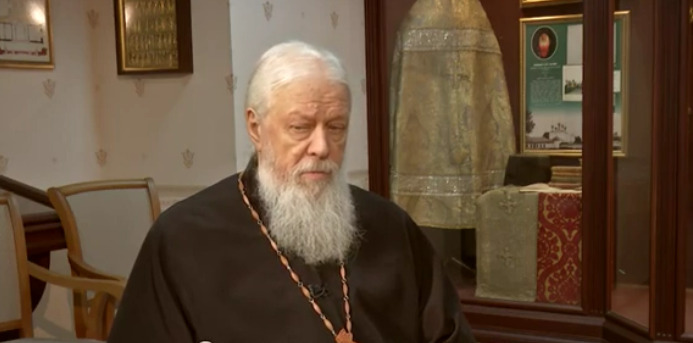 Bishop Augustin
Bishop Augustin
The Bishop even commented accession of BiH to NATO, which indicates that he was not only on a religious mission, but also on a political mission for which he unquestionably had support of Russia. The Russian Orthodox Church is important, but not the only “tool” to realize pro-Russian influence, particularly on the territory of Republika Srpska.
“They are selling something else as well, and that is demagogy of pan-Slavism and pure Slavic soul, because others do not have it and because they are dirty, vile and corrupt as only the West can be. They are selling it to the citizens, who prefer religious Eastern Orthodoxy, believing that it is an absolute possession of truth, political, religious and any other”, is the view of sociologist Sead Pašić.
Mission from the kindergarten to the faculty
A modern Russian language classroom was opened at the Faculty of Philosophy of the Istočno Sarajevo University in mid-March this year. “Russian humanitarian mission” donated the equipment worth 54.000 KM. A smart Russian language classroom was a few months earlier presented in a private Banja Luka kindergarten. It was a project implemented by the same “Russian humanitarian mission” in cooperation with the citizens’ association “Kolibri”.
“We thank the Russian humanitarian mission that is helping us to return Russian language to this area, to have it present and to have the youngest children learning Russian language and Russian culture already in the kindergarten. They will become the holders of our symbol of unity and the holders of friendship between our people”, said on that occasion the First Secretary of the Embassy of the Russian Federation in BiH, Anton Sokolov.
“To succeed in making the way of learning the language, we should start right out of the kindergartens and have a clear logical sequence of kindergarten, elementary school , high school and the faculty,” explained the mission Aleksej Polkovnikov, the director of the “Russian humanitarian mission”.
Polkovnikov had in mid-March 2018 signed a “Memorandum of cooperation with the representatives of the non-profit organization for support to humanitarian programs the Russian humanitarian mission” with the then-minister of health, Dragan Bogdanić. Their activities do not end at promotion of Russian language. They donated a system of solar panels in Bileća, organized a mobile clinic at which the doctors from Russia did eye examinations on the territory of Sarajevo-Romanija region.
In March of this year they signed an agreement on cooperation with the company “Vode Srpske”, and at the beginning of May they delivered medical aid in agreement with the Ministry of Health of Republika Srpska.
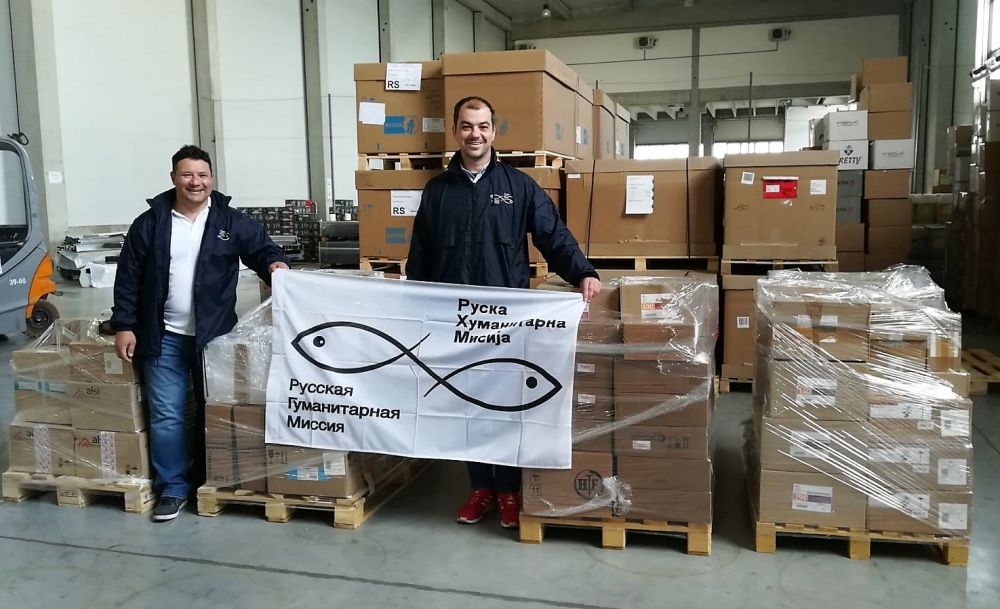 Russian humanitarian mission
Russian humanitarian mission
The head of the “Russian humanitarian mission” is Yevgeny Primakov, the grandson of the eponymous prime minister of Russia. He is member of the Russian Duma, and he was a trustee of Vladimir Putin at the 2018 presidential elections. He had been arrested and expelled from Ukraine that declared him national security threat. Primakov represents the “Russian humanitarian mission” as a non-political organization, but nevertheless he reminds of his grandfather’s words about the meaning of “soft power” for Russia and importance of humanitarian activities in the Balkans.
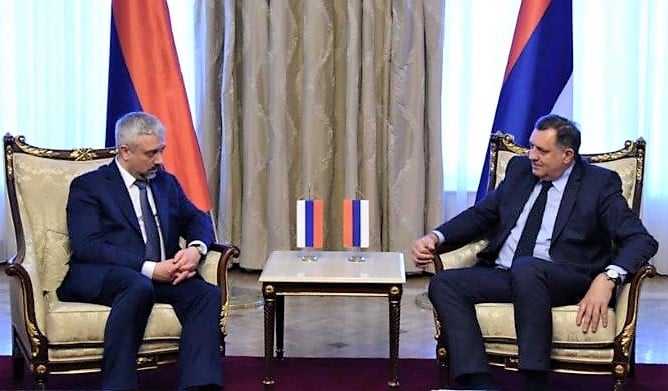 Yevgeny Primakov and Milorad Dodik, Banja Luka, March 2019
Yevgeny Primakov and Milorad Dodik, Banja Luka, March 2019
The Fund “Art, science and sport” whose founder is the Russian billionaire Alisher Usmanov is mentioned as the partner of the “Russian humanitarian mission” in the Balkans. Usmanov was the CEO of “Gazprom investholding”, a company that is part of the state-owned Russian company “Gazprom”, owner of Facebook and Twitter shares, Internet company mail.ru and the football club Arsenal, all in all some twenty billion dollars. The US Department of Treasury has put Usmanov on the list of 96 oligarchs, who have acquired their wealth based on connections with Vladimir Putin.
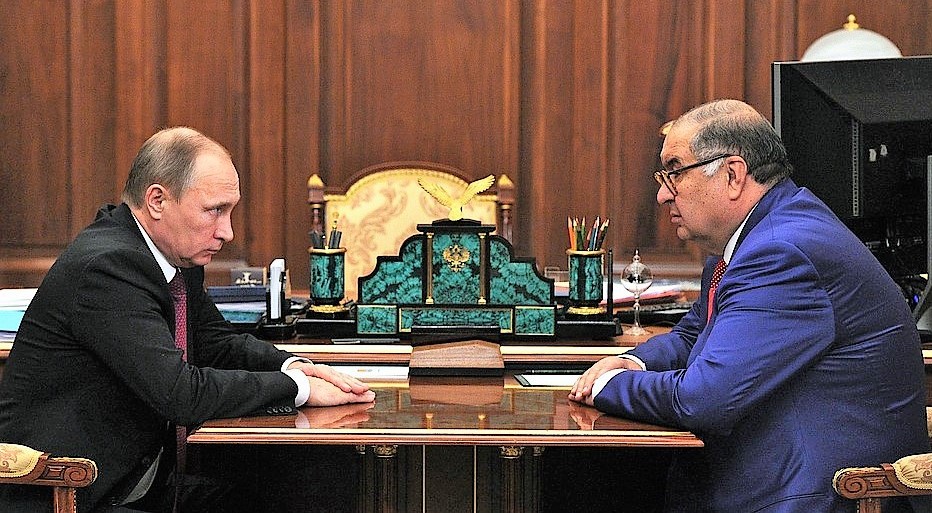 Vladimir Putin and Alisher Usmanov
Vladimir Putin and Alisher Usmanov
Parallel to the political and economic lobbying of the Russian interests in BiH one cannot entirely neglect the promotion of the Russian culture and language both through the academic communities and in the field by establishment of different associations as promoters. So the society of Serbian-Russian friendship “Brotherhood” states that the focus of their work is promotion of Russian language and further deepening of the Serbian-Russian cooperation in the field of education, science and economic cooperation, as well as forging links between the students through studying in Russia.
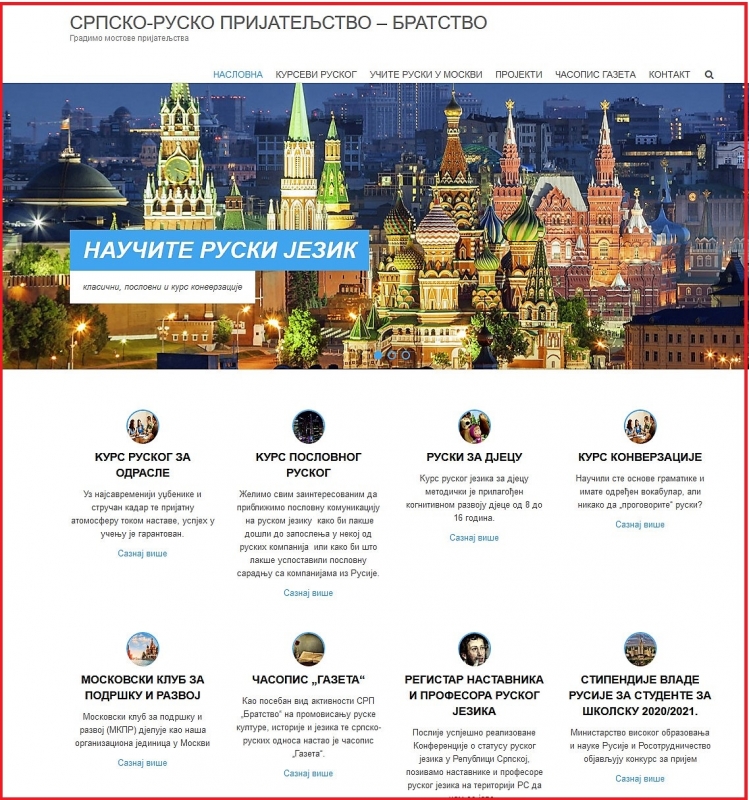 Serbian-Russian friendship – Brotherhood; Learn Russian language; Russian language course for adults, business Russian course, Russian for children, Conversational course; Moscow club for support and development, Journal „Gazeta“, Register of teachers and professor of Russian language, Scholarships of the Government of Russia for students in academic year 2020/2021.
Serbian-Russian friendship – Brotherhood; Learn Russian language; Russian language course for adults, business Russian course, Russian for children, Conversational course; Moscow club for support and development, Journal „Gazeta“, Register of teachers and professor of Russian language, Scholarships of the Government of Russia for students in academic year 2020/2021.
The Center of the Russian Foundation “Russian peace” was opened in Banja Luka in 2002, already as part of the National and University Library of RS. Its main goal is promotion of Russian language and culture. The Foundation was established in 2007 by the decision of the Russian president Vladimir Putin.
“This is not the end; the project of Russia does not end here. I am satisfied that one of the key points of the agreement on cooperation of the president of Russia and the president of RS, in which great attention was paid to the culture, has been completed. I find this to be the right place for the Russian center and I believe that it is a center that will rise to the top very soon”, said the Russian Ambassador to BiH at that time, Alexander Bocan-Harachenko.
His successor, Ambassador Petr Ivancov, actively cooperates with the higher education institutions. He organizes, not only on the territory of Republika Srpska, promotion of the Russian universities and opportunities for studying in Russia, which is presented as a country of “hope and high quality education”. During the last year’s visit to the Banja Luka University Ambassador Ivancov presented the possibility of having a lecturer financed by the “Russian humanitarian mission” coming to the Philology Faculty. It is also possible to apply for free studying in different fields in Russia through the Russian Embassy.
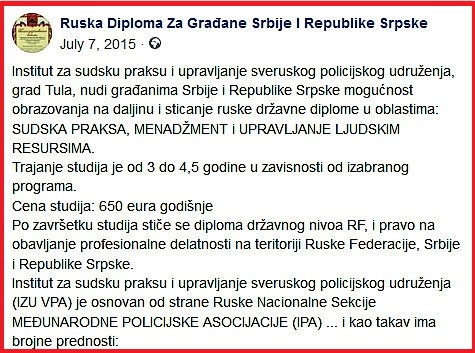
Member of the Council for protection of constitutional order of RS and Dean of the Faculty of Security Science Banja Luka, Predrag Ćeranić, believes that the influence of Russia in Bosnia and Herzegovina has been generally over-dimensioned, including the culture and education segment.
“In how many schools in Srpska is Russian taught, and in how many English and German language? That piece of information will most illustratively indicate the ratio between the Russian and the Western influence. Yes, it is true that young people, not only from Srpska, but also from the region, are going to the EU countries in search of a job. Russia is under sanctions and it impacts the Russian economy, even more than the Russians are able to admit. However, the ties between the Serbs and Russian people are sincere and deep, and exist since time immemorial. Serbs love Russians, sincerely celebrate geopolitical successes of Russia, and Serbs feel the love of Russia”, explains Ćeranić for Žurnal.
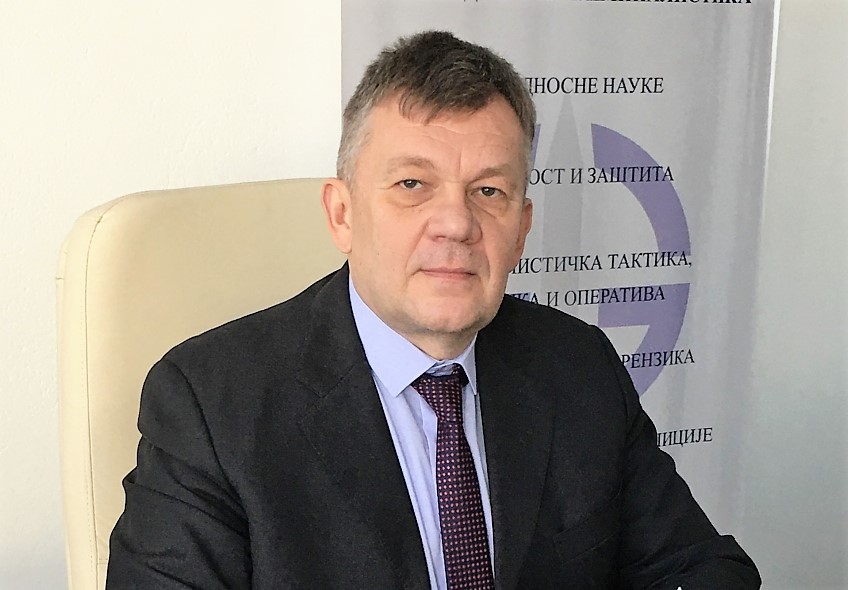 Predrag Ćeranić
Predrag Ćeranić
Apart from the academic community Russia also uses small, but radical and aggressive associations such as “East alternative”. President of this association, Vojin Pavlović, was disturbing the citizens of Srebrenica for years by putting up the posters of war criminal Ratko Mladić or pictures of Vladimir Putin just before the burial of genocide victims in Potočari, for what he was tried in court.
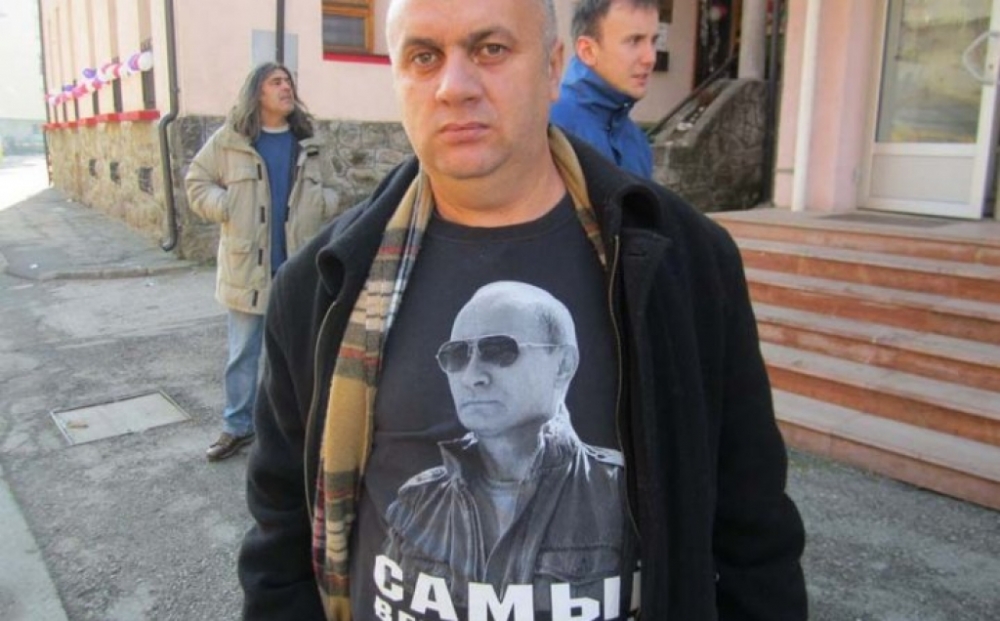 Vojin Pavlović
Vojin Pavlović
All of that did not pose any problem to the Russian Embassy in BiH to have, after he had failed in Srebrenica, supporting Pavlović in his initiative to place a memorial plaque to the deceased Russian Ambassador to the UN, Vitaly Churkin in Istočno Novo Sarajevo.
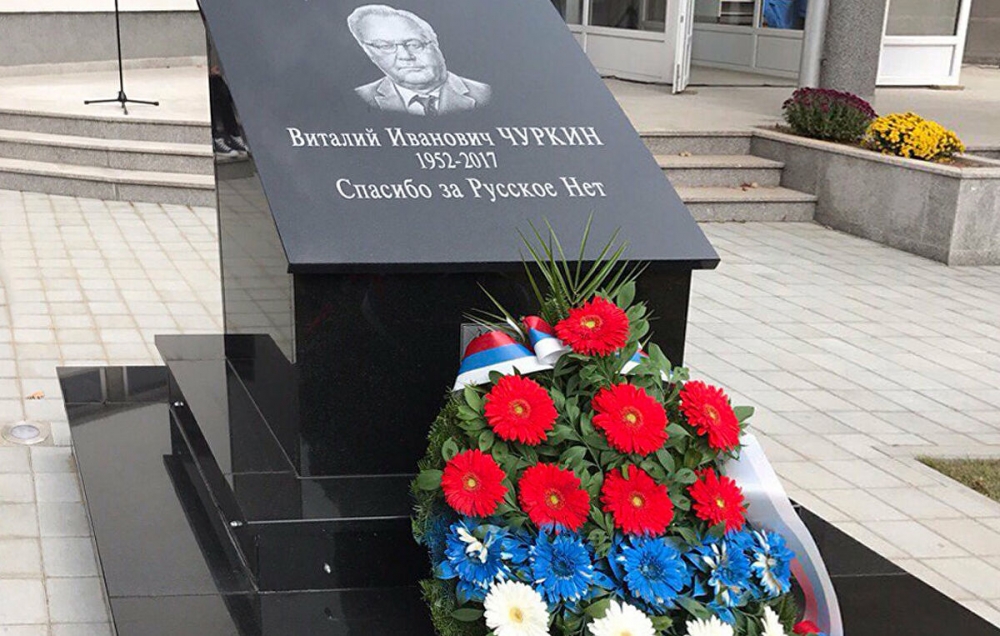
Pavlović carries on, and now asks the Srebrenica Municipality for a permit to erect a memorial bust to the Austrian writer Peter Handke, Nobel laureate who denies Srebrenica genocide.
There is no doubt that he will receive support from the defender of Handke’s views, BiH director Emir Kusturica, one of the most famous propagandists of Russia and Vladimir Putin’s politics in this region. Some time ago Kusturica was actor of an idea of establishment of an absolutely pro-Russian party, but it was denied later on, probably due to lack of expected financial support.
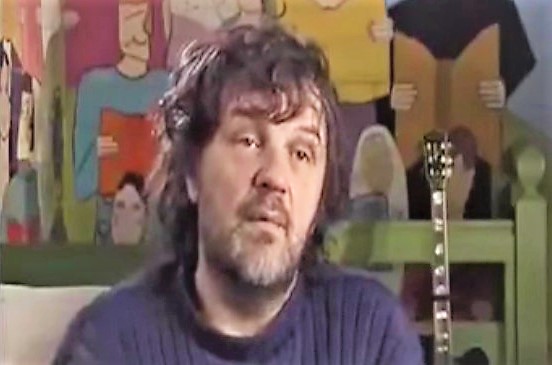
“We are brotherly peoples, we are brothers and sisters. It is very simple; there is nothing more to tell. Our languages and our religion are identical. Our ideas are easily connected”, said Kusturica about Serbian-Russian relations.
From movie screenings to promenade of “Cossacks”
Reviews of Russian movies, the Days of Russian culture, promotion of works of Russian literature, are part of almost day-to-day activities of the Russian Embassy. Embassy provides assistance in establishment of associations and societies that promote good Serb-Russian relations. So, the establishment of the Association of Serbian-Russian Friendship in Rogatica was supported after Doboj.
The pro-Russian associations established in Bosnia and Herzegovina are numerous. In addition to already mentioned ones, there are associations that at certain time periods have been more or less intensively working. These are: Association “Serbian-Russian bridge” in Banja Luka and Istočno Sarajevo, Association of Serbian-Russian friendship “Brotherhood” in Banja Luka and Istočno Sarajevo, Serb movement “Vladimir Putin” in Istočno Sarajevo, Association of Serbian-Russian friendship “Zavet” from Bijeljina, Russian Center of the Foundation “Russian Peace” from Banja Luka, Russian cultural Center in Banja Luka, Center of Russian language and culture “Vozroždenije”.
The numerous associations from Serbia, which conduct activities on the territory of Republika Srpska, should also be included. These are “Society of Russian-Serbian friendship Moscow”, “Society of Serbian-Russian Friendship Belgrade”, “Society of Belarus-Serbian friendship Minsk”, “Academy of Slavic science Moscow”, STP “Riznica”, “Educational-patriotic organization “Stяg” Moscow.
“Russia always sees a bigger picture, and that bigger picture only means territory. Not citizens, but territory. That country projects the image of how reliable it is, how it does not betray allies, how it takes care of the citizens helping them in case of floods, fires, etc., thereat putting its resources at disposal. I must admit that they are doing it pretty well, because it is a country that is very poor”, explains Pašić.
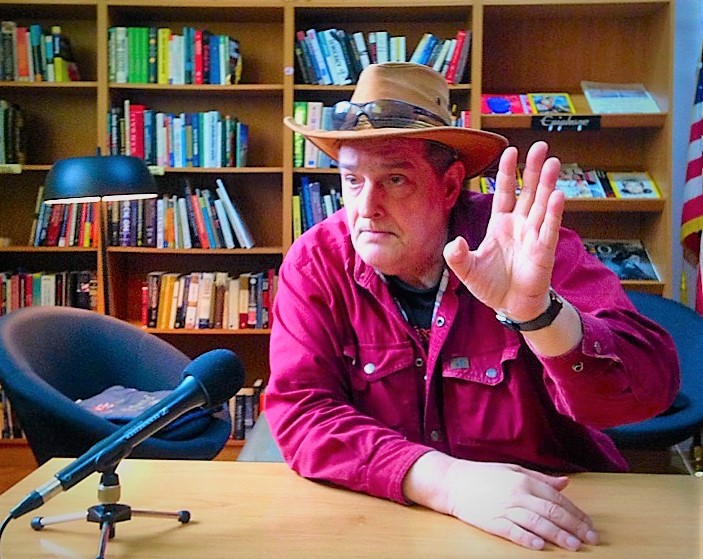 Sead Pašić
Sead Pašić
It should be reminded that a bit more open story about the hidden military-political influence of Russia in Bosnia and Herzegovina, as well as the support they provide to the authorities in Republika Srpska personified in Milorad Dodik, had started in 2014. A hundred of Russian Cossacks turned up in Banja Luka just a few days before the 2014 General Elections, presenting themselves as a folklore group. Their dancing skills proved to be quite modest.
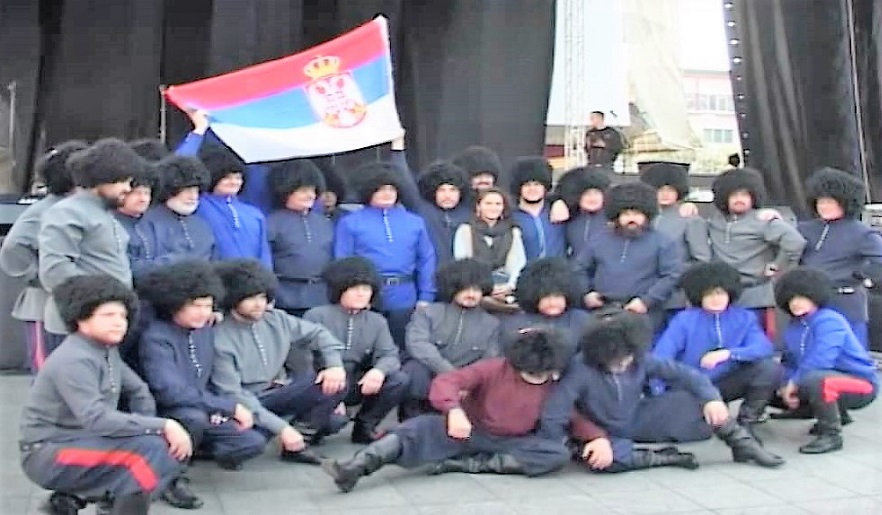
The proof that the suspicion in the “cultural activity” was justified will be presented by the subsequent movements of their leader Nikolay Dyakonov, who was one of the organizers of the pro-Russian paramilitary actions in Crimea and often in the company of Russian war veterans.
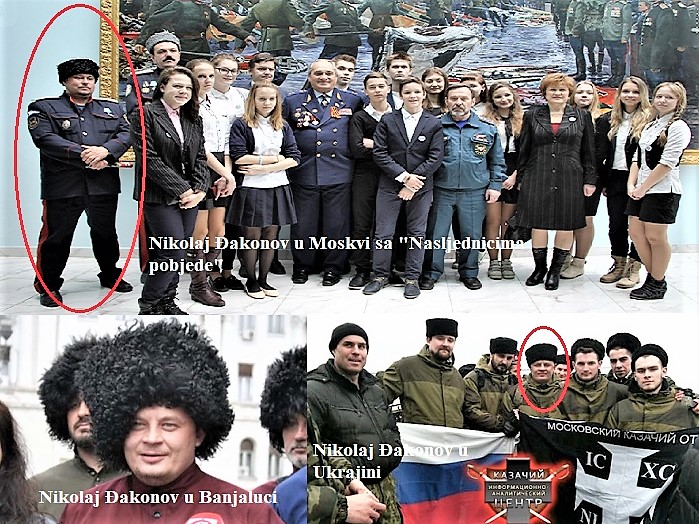 Nikolay Dyakonov in Moscow with the “Successors of victory”; Nikolay Dyakonov in Banja Luka; Nikolay Dyakonov in Ukraine
Nikolay Dyakonov in Moscow with the “Successors of victory”; Nikolay Dyakonov in Banja Luka; Nikolay Dyakonov in Ukraine
Žurnal has already written about various “cultural” and humanitarian” associations such as “Night Wolves” or “Serbian Honor” that were a mean to express power of the authorities in Republika Srpska under the aegis of help to the citizens of Republika Srpska. These were in essence paramilitary or criminal organizations, thus completely opposite to how for example the RS Ministry of Trade and Tourism had described them, as associations for “promotion of Republika Srpska through development of motorcycle tourism in the country and abroad”.
Both “Night Wolves” and “Serbian Honor” have a connection with the Serbian-Russian Community “Zavet” established in Brčko District, which is quite active in organizing gatherings of Russian volunteers from the battlefields in BiH, held in Višegrad.
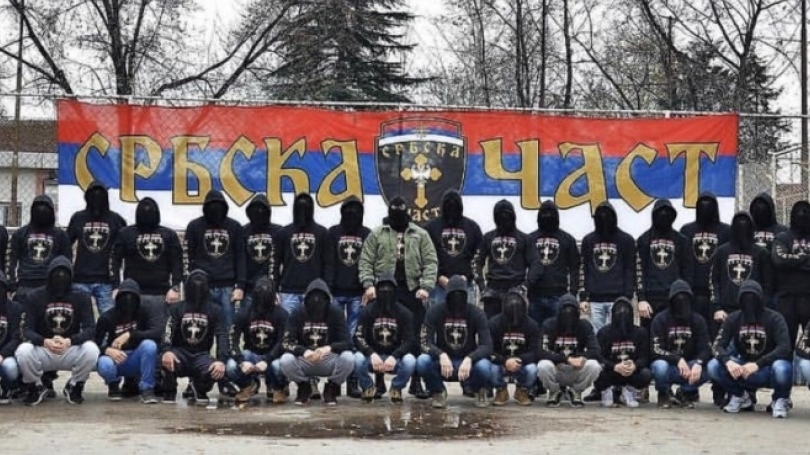 Serbian Honor
Serbian Honor
We have already mentioned that concrete support of Russia was often declaratory or insufficient in relation to how it was thunderously announced by the political leaders of Republika Srpska. They thus created an impression with the citizens that they are personally an important factor in the relations with Russia. It also happened with the announced significant help in medical material at the time of Covid-19 pandemic. Military experts for disinfection of premises appeared, but it was nothing compared to the anticipated help of “brotherly” Russia, far less valuable than Dodik’s just lobbied permit for the import of Russian insufficiently tested medicines to BiH. The lack of anticipated help did not prevent expression of gratitude to Russia.
 Thank you Russian brothers
Thank you Russian brothers
Media and Russian “brides”
The pro-Russian influence in all the given areas would be incomplete without media support. The Russian national media outlets launch services in Serbian language such as Sputnik Serbia, which is financed by the Russian Government. Russian “Gazeta” is one of the media “weapons” used by Dodik and SNSD officials, and his political partner Dragan Čović, leader of HDZ BiH. The Head of the Office of Russian Gazeta for the Balkans, Alexander Borisov, is responsible for their promotion in Russia from which “the good repute” is then forwarded to Republika Srpska.
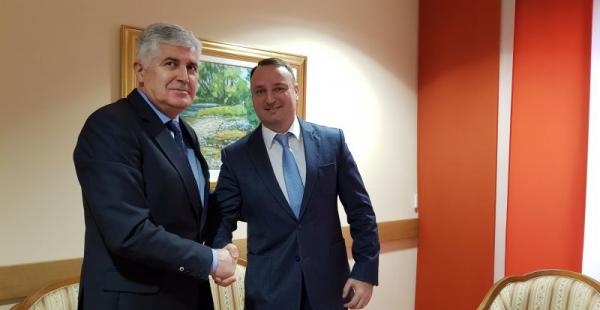 Dragan Čović and Alexander Borisov
Dragan Čović and Alexander Borisov
Dodik publicly invited the Russian media to bolster their influence in Bosnia and Herzegovina during his stay in Russia in 2018.
“Same as done by some others, there should be a Russian news media outlet, which would have electronic, TV program in local language and cover the region, as it is done by N1, “Al Jazeera” and others who have been present for a long time and no one sees it as a problem anymore. But, if Russia would do the same, it would trigger an avalanche of attacks both on us and the Russians, and they are actually not doing anything”, concluded Dodik.
There were some announcements that Gazeta will open a branch office in Bosnia and Herzegovina, and that it is only matter of days before it becomes operational. Journalist Zoran Šarenac was mentioned as editor-in-chief. However, in an interview for Žurnal Šarenac denies any financial or editorial ties between the local and Russian Gazeta, claiming that the portal will become operational very soon and that it will become clear that there is no “pro-Russian narrative” as some have been announcing.
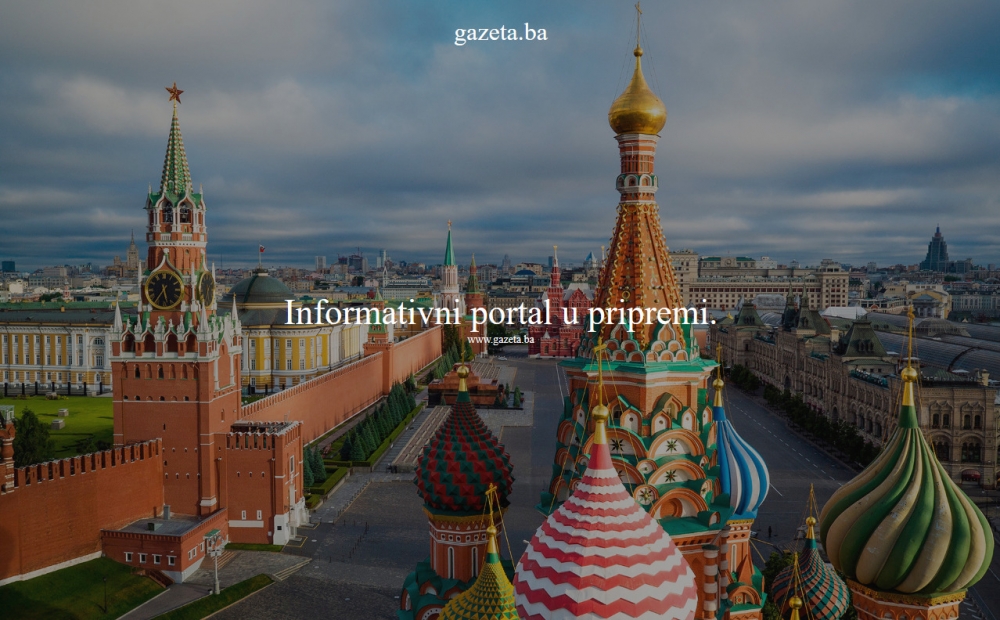 News portal under construction
News portal under construction
Local media outlets such as RTRS, Srna News Agency, Alternative TV or Glas Srpske daily, and portal InfoSrpska only publish positive news related to Russia. There is also portal Iskra.co, registered in Višegrad, behind which is the “ruler” of cultural gallimaufry called Andrićgrad, Emir Kusturica, who loves to exaggerate everything related to Russia and Russians. These are important links for Milorad Dodik, who maintains power on pro-Russian story.
Russia has less or more openly expanded its influence in Bosnia and Herzegovina in different ways. Political parties and individuals from these parties were used, together with non-government organizations that pursued policies of their frequently non-transparent financiers and in the background it all lead to destabilization of Bosnia and Herzegovina, i.e. to its division into completely ethnic countries. These attempts intensified as it became clearer that the majority in BiH has opted for the path towards European integrations and accession to the NATO.
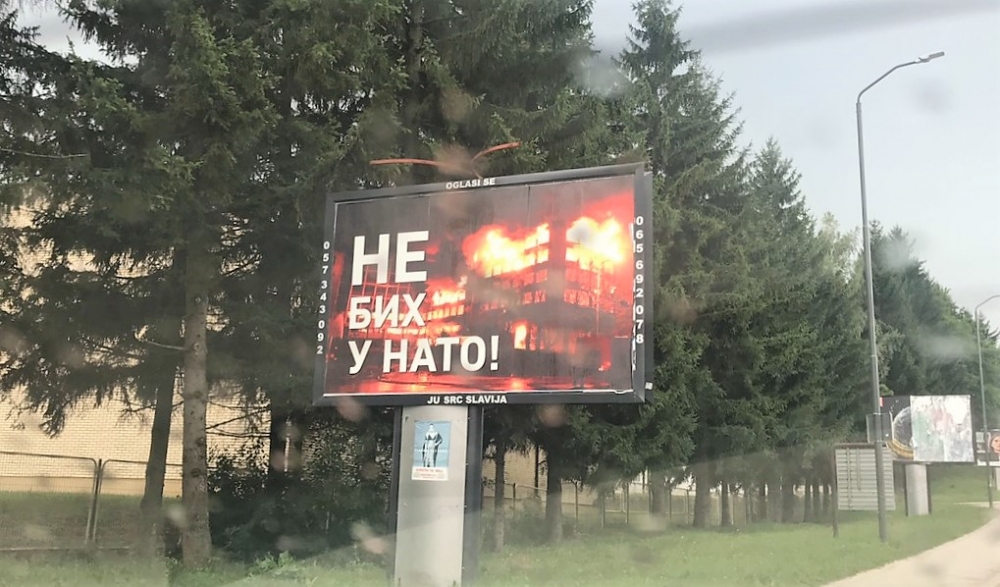 I would not go to the NATO!
I would not go to the NATO!
The fact that advocates of Russia at any cost did not lack lucid ideas sometimes is evident in the initiative that the Association “Serbian-Russian Bridge” from Banja Luka had launched in 2014. According to their claims they have documented 8.000 bachelors in villages and suburban settlements of Republika Srpska in contrast to tens of thousands Russian women who are single and ready to be paired with a “groom” in Republika Srpska. Of course, such an idea of mass “import” of spouses from Russia was not realized.
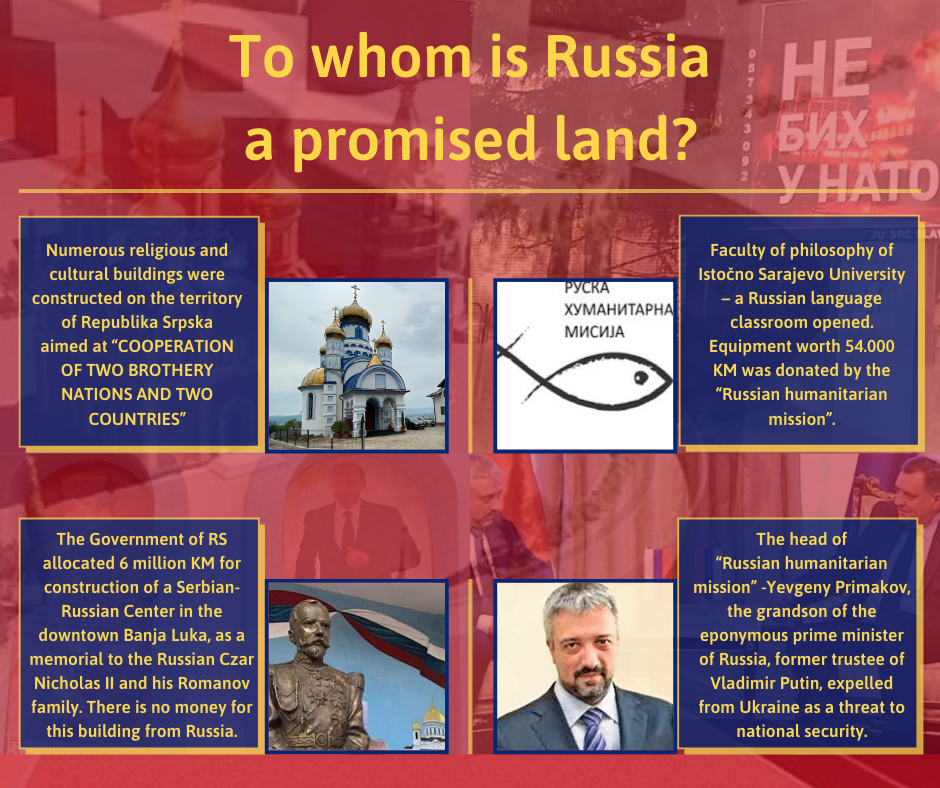
(zurnal.info)







